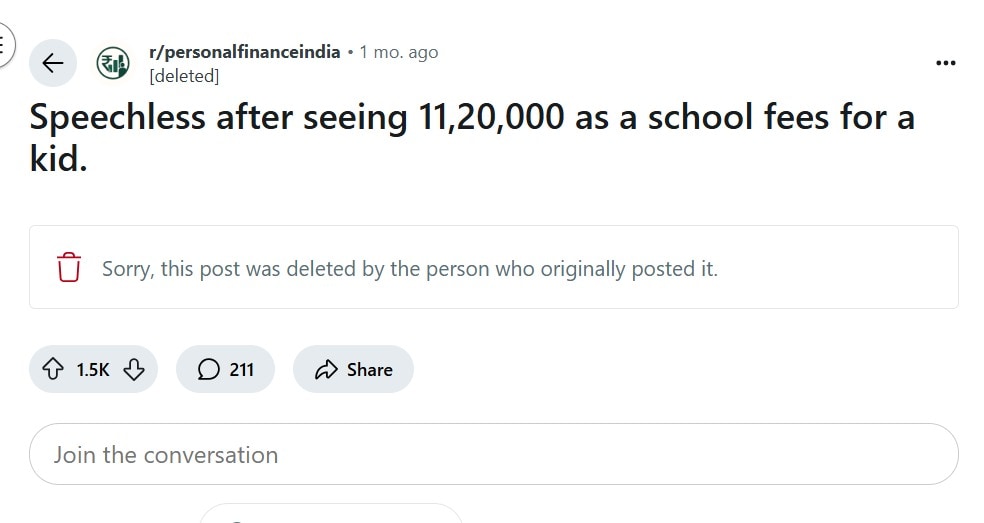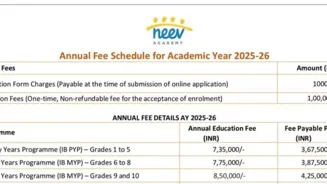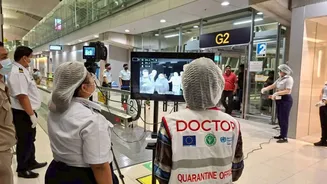Education costs are increasing at an alarming rate. High school fees have become a major concern for parents in India, with charges soaring in metropolitan areas. Throwing light on the same, a picture
of a Bengaluru-based international school’s fee structure has gone viral on social media. The snapshot, shared on X (formerly Twitter), reveals the annual tuition fee for the 2025–26 academic year at the IB-affiliated institution in the city is Rs 7.35 lakh.
What’s even more surprising? This amount is for students of Grade 1, with costs rising to Rs 11 lakh for Grades 11-12. Yes, we aren’t kidding. Hold on to your horses! These figures exclude expenses like uniforms, books, transportation, or extracurricular activities. If a parent wants these additional expenses, it could push the total beyond Rs 8 lakh annually for a single child.
As per the document, the Primary Years Programme (Grades 1–5) requires parents to pay a term fee of Rs 3,67,500 half-yearly, bringing the annual total to Rs 7,35,000. Also, the school charges a non-refundable admission fee of Rs 1 lakh along with an application fee of Rs 1,000.
The post read, “Annual fee structure of primary school years at one of the better institutions in Bangalore. Rs 7,35,000 per annum from Grade 1. Don’t miss the Rs 1,00,000 non-refundable admission fees.”
Annual fee structure of primary school years at one of the better institutions in Bangalore.
₹7,35,000 per annum from Grade 1.
Don’t miss the ₹1,00,000 non-refundable admission fees. pic.twitter.com/mHoOMRd6Qi
— Hardik Pandya (@hvpandya) August 30, 2025
Social media users’ views on the viral post
The now-viral post quickly triggered a wave of reactions, with many arguing that such costs apply only to those choosing elite schools. Other talks are about the escalating costs of private education in India.
An X user wrote, “The American International School Chennai’s tuition fees are 27 lakhs. In India all kinds of institutions exist, and people choose based on their capacity. Why complain?”
“Anyone who considers this a reasonable amount needs to touch grass. It is EDUCATION. A basic human right,” another said.
An individual stated, “I have experienced and can boldly say that the education and medical institutions in Bengaluru are very greedy. The cherry on top is that most of these are held by politicians or related family members, legally or through some other route. Does the government have the willpower to regulate fees?”
“Is this average all around in Bangalore or have you taken the highest one? Even Noida’s best doesn’t have this,” posted a user.
An account wrote, “This is not education; this is extortion in a school uniform. Seven and a half lakhs a year for Grade 1 and a one lakh entry fee that vanishes into thin air. Parents are fooled into believing they are buying brilliance for their kids, but what they are actually buying is stress, entitlement, and a hollow system that rewards money over merit.”
“Sad. Most parts of world education are free. And here it’s just business and an earning machine,” stated another.
Similar viral post about exorbitant school fees
A few weeks back, another post about how much a couple working at Google spends on their child’s education took the internet by storm. According to a Reddit user, the parents pay a whopping Rs 11.2 lakh every year for just one child’s school fees.
The user, who claims to work at a junior level in a small wealth management firm, said he came across the young couple’s financial details while reviewing a client file. “They make around Rs 60 lakh per annum combined. When I was going through their yearly cash flow, I was stunned to see Rs 11.2 lakh listed just for their single child’s school fees,” the post read.

Comparing their lifestyle to his own, the Redditor then said, “This is the first time I have come across such numbers. I have heard of Rs 2–4 lakhs per year, maybe even Rs 5–6 lakhs, but Rs 11.2 lakh? And here I am, debating a thousand times whether I should spend Rs 20–30 lakhs on a good MBA,” he added.
His post sparked debate, with people debating topics like rising education costs, privilege, and how class differences affect choices.













